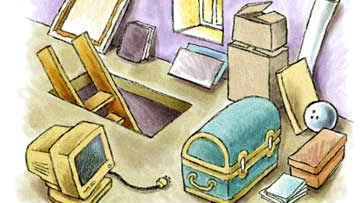Lessons from Sherlock Holmes Pt.II: Cultivate What You Know to Optimize How You Decide

Today’s lesson from Sherlock Holmes deals with learning to cull and to cultivate knowledge in such a way that your decision process will be optimized for the question at hand, and not get bogged down in irrelevant minutiae – a lesson that is all too relevant in the age of the internet, when we have a constant stream of information at our beck and call.
A mind is an attic: keep yours well organized
In “A Study in Scarlet,” Dr. Watson expresses surprise that Holmes is ignorant of Copernican theory and the composition of the solar system. Holmes explains that he does his best to forget any information that is not relevant to his existence:
“You see,” he explained, “I consider that a man’s brain originally is like a little empty attic, and you have to stock it with such furniture as you choose. A fool takes in all the lumber of every sort that he comes across, so that the knowledge which might be useful to him gets crowded out, or at best is jumbled up with a lot of other things, so that he has difficulty laying his hands upon it. Now the skillful workman is very careful indeed as to what he takes into his brain-attic. He will have nothing but the tools which may help him in doing his work, but of these he has a large assortment, and all in the most perfect order. It is a mistake to think that that little room has elastic walls and can distend to any extent. Depend upon it there comes a time when for every addition of knowledge you forget something that you knew before. It is of the highest importance, therefore, not to have useless facts elbowing out the useful ones.”
“But the Solar System!” [Dr. Watson] protested.
“What of the deuce is it to me?” he interrupted impatiently: “you say that we go round the sun. If we went round the moon it would not make a pennyworth of difference to me or to my work.”
A cluttered mind prevents organized thought
Holmes, of course, is exaggerating. Obviously, the solar system does make a difference to both him and his work, on a broad scale and even in the particulars (the properties of physics, for instance, are of great importance to the detective – and those he has down to an exact science; he just doesn’t care about the broader picture when it’s not immediately relevant). But the principle is a valid and useful one.
Especially when it comes to decision making, Holmes’s analogy is remarkably apt. When making a decision, it is easy to get distracted if too much clutter has accumulated in the attic of our mind. We need to learn how to shift through the layers of dust and only use what is relevant – and prevent the irrelevant from clouding our judgment. No matter how many facts are at our disposal, how capacious and deep our memory might be (and there are people whose talent in memorization is staggering), it is useless unless we know how and what to apply to a particular situation. In fact, the “what” is a major component of the “how.” Knowing what to use and what to ignore is one of the fundamental skills of a good decision maker.
In a decision, it is crucial to ignore so-called distracters, things that are actually irrelevant but that can influence our judgment if we are not careful. These come in many guises: emotions, for one, and personal impressions (which, while sometimes useful, are often completely beside the point); or, additional information that should make no difference but that actually does impact our decision (for example, the color of a text: we might choose one option over another because it happens to be in blue, and we prefer blue to red, the color of the other option. Should that matter? Absolutely not. But many of us make such personal judgments constantly, letting small preferences, superstitions, rituals and routines guide us away from what we should be looking at).
Here’s the crucial point: even if everything is there, it is rendered useless if we don’t know what we need to access and what we need to sweep away at any given point. And the more cluttered our mind attic, the more difficult it can be to shift the useful from the useless – and the more we might find that the useful has disappeared into some dark corner, or under some strange box, and that we can’t find it altogether.
Our attics can change, and this is a benefit worth exploiting
Of course, our brain attic is not immutable. We can move things out and move others in. We can shift items around, box them differently, make some easier to access or to identify. In other words, our memory may change. Unlike Holmes, whose fictional mind is perfectly fixed, ours is in flux, and when we return to the attic for something, we may find it is no longer the same as when we left it. We might not even realize the shift has occurred. Every attic will be different, and even the same attic can change over time.
Where I don’t agree with Holmes is that there is no room for a broad base of general knowledge. In a non-fictional world, you never know just what the precise tools are that you will need, and it is best to be prepared. A broad base of knowledge, I often find, ends up being relevant to far more than you might originally think possible. What we read, what we hear, what we learn even in those classes we think we’ll never use again, can all color how we approach a problem and can shed insight on a seemingly unrelated problem in the most startling ways. It would be a shame to clear everything quirky out of your attic; then, it would be a boring place indeed. (And here, it also bears noting that even in Holmes’s so-called stark attic, resided a vast knowledge of music, literature, science, and countless fields that seem to have little to do with detective work).
Has the internet expanded our attics?
The internet provides a tremendous resource for storing and retrieving information. What does that mean for our mind attics?
In a recent study in Science, Betsy Sparrow and a team of researchers from Columbia, Harvard, and the University of Wisconsin-Madison found two important effects: first, when people are primed to think about computers, or when they expect to have access to information in the future, they are far less able to recall the information. However—and this is the second effect—they are far better able to remember where (and how) to find the information.
This study has direct implications for how we think about our own storage space, the attic of our minds, as we make decisions and interact with the world. As with most things, it provides us both with opportunity and with further need for caution. The opportunity: we can store “clutter” that might be useful in the future, and know exactly how to access it should the need arise. And the need for caution: we might be tempted to store even that which should rightly be in our mind attics outside of them, and the curatorial process (what to keep, what to toss) becomes increasingly difficult.
As with effective leadership and functional teamwork, when it comes to memory, smart delegation is key.
How to exploit expanded storage without subverting our mind attics
Holmes had his filing system. We have Google. We have Wikipedia. We have books and articles and stories from centuries ago to the present day, all neatly available for our consumption. We have our own digital files.
But we can’t expect to consult everything for every choice that me make. Nor can we expect to remember everything that we are exposed to – but the thing is, we shouldn’t want to. We need to learn instead the art of curating our attics better than ever. If we do that, our limits have indeed been expanded in unprecedented ways. But if allow ourselves to get bogged down in the morass of information flow, if we store the irrelevant instead of those items which would be best suited to the limited storage space that we always carry with us, in our own heads, the digital age can be detrimental.
Here’s a good check. If you were deprived of all technological access (I mean computer, phone, any files that you store, everything) for a day, would your ability to make solid decisions suffer? How about a week? A month? A year? If the very thought sends you into a panic, you might want to recheck your use of your limited attic space. And even if it doesn’t, take a look around: are you using your resources to their optimal capacity?
Remember to maintain your attic vigilantly
It’s nice to do a periodic check. Even the best-kept attic needs to be updated every so often. So, look, make the adjustments necessary (does anything need to be thrown out? Anything else need to be moved in?), and then, enjoy the benefits that technological access allows. We have more space than ever before. Let’s use it productively.





